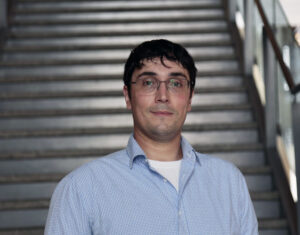
A career in engineering wasn’t always an ambition for Professor Justin Beland (MIE).
“For a good part of high school, I planned to become a firefighter, move to Thunder Bay to train, and return to Toronto, but I didn’t explore much outside of that,” says Beland, who joins the Department of Mechanical & Industrial Engineering as a new assistant professor, teaching stream.
“As I got closer to graduating, the principal at my high school suggested that I take physics, chemistry, calculus, biology and philosophy, instead of focusing solely on gym. I ended up developing a real interest in physics and calculus, and my motivation shifted toward academics with an interest in engineering.”
Following some sage advice from his mother, Beland began his engineering studies, which has followed a diverse path since his undergraduate days.
Graduating from Western University with a BESc in civil engineering and BSc in physics, he then made a pivot when entering his graduate studies at the University of Toronto to focus on optimization algorithms, probabilistic modelling and machine learning.
“After my undergraduate education, I wanted to leverage my background in structural engineering within aerospace by joining the advanced aerospace structures group at the University of Toronto Institute for Aerospace Studies (UTIAS),” says Beland.
He adds that his interest in aerospace was sparked after he attended air shows with his grandfather as a child, and later connected with the movie Apollo 13.
“But it turns out I couldn’t get into that program. Instead of seeing this as a setback, I ended up working with Professor Prasanth B. Nair (UTIAS), who focuses on algorithm development and creating new types of data-driven models, which turned out to align well with my career goals.”
During his graduate studies, Beland had the opportunity to work on research projects with far-reaching applications in areas such as aircraft engines, biomedical systems and robot design to name a few. These projects involved the development of novel function approximation algorithms and the extension of Bayesian optimization algorithms to high-dimensional problems and optimization under uncertainty.
From this, Beland gained valuable insights from peers and collaborators. He was also involved in teaching curriculum and had the chance to instruct several machine learning courses for both undergraduate and graduate students.
Beland is now the newest instructor for MIE250: Fundamentals of Object-Oriented Programming and APS1070: Foundations of Data Analytics and Machine Learning. He also plans to introduce new courses based on his research as well as more in-depth courses related to deep learning methods.
“During my undergraduate and graduate studies, I learned programming, all sorts of mathematics, machine learning, engineering design and how to think like an engineer, all while meeting lifelong friends who I’m still in touch with, both professionally and personally,” he says.
“I want to apply those principles in my courses and make sure students are making the same kinds of connections to benefit them outside of the classroom. I’m excited to create a classroom environment that motivates and engages students, making the courses both fun and relatable.”
Along with a commitment to making complex topics understandable and accessible to students, Beland is also involved in work inside and outside of U of T Engineering. He continues to work on research projects stemming from his PhD research, including modelling techniques that link deep neural networks to Bayesian networks, Bayesian optimization methods for high-dimensional problems, and optimization under uncertainty.
“Where I am now is far different from where I imagined I would be when I was in high school,” he says.
“My engineering education gave me the opportunity to explore structural and aerospace engineering, programming, data science and machine learning plus pursue research in an area that I really love. I’m excited to continue on this path and work with our newest students to help them uncover their future goals and potential.”
– This story was originally published on the University of Toronto’s Faculty of Applied Science and Engineering News Site on December 3, 2024, by Kendra Hunter.